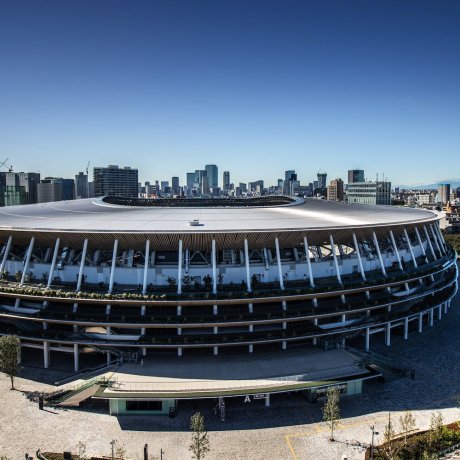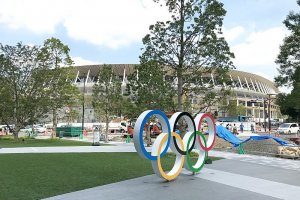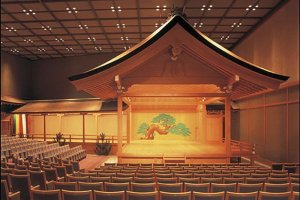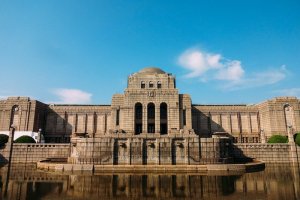The Meiji Jingu area is close to the bustle and excitement of Shinjuku and Shibuya, yet the atmosphere here couldn’t be more different. Even though you’re in the heart of Tokyo, you’re surrounded by nature on all sides. This part of the city has been attracting attention recently with the construction of the New National Stadium for the 2020 Tokyo Olympics and Paralympics. Here are our top 5 picks for things to see and do in the area:
1. National Noh Theater

If you’re interested in traditional Japanese performing arts, such as noh and kyogen, the National Noh Theater is the place for you. Noh is a type of theatre involving music, dance, and drama, while kyogen are short comical acts that come between the main noh performances, with both art forms dating back to the 14th century. Noh is listed as an Intangible Cultural Property by UNESCO. The theater includes a 400-year-old stage made from cypress. Performances are accompanied by English subtitles for the enjoyment of international visitors. Access: Five-minute walk from Sendagaya Station

A Day at the National Noh Theater
The National Noh Theater is a 5 minute walk from Sendagaya Station on the JR Sobu Line, and is where traditional Noh and Kyogen..
2. Shinjuku Gyoen

Once you enter the gates of this garden oasis, it’s easy to forget you’re still in Tokyo. Shinjuku Gyoen was originally an imperial garden and was completed in 1906. However, it was opened to the public in 1949 and has been a much-loved part of daily life in Tokyo ever since. The garden covers 58.3 hectares and blends Japanese and Western features with three main styles: the Formal Garden, the Landscape Garden, and the Japanese Traditional Garden. The park is particularly beautiful in the spring when the cherry blossoms are blooming. Autumn is another popular time to visit, with the fall foliage and the annual chrysanthemum exhibit in November. Access: You can enter the park from one of three different gates. A five-to-ten-minute walk from any of the following: Shinjuku Gate--Shinjuku Station and Shinjuku Shinjukugyoenmae Station; Okido Gate--Shinjukugyoenmae Station; Sendagaya Gate--Sendagaya Station

Shinjuku Gyoen National Garden
3. New National Stadium

Preparations for the 2020 Olympic and Paralympic Games are in full swing One of the most important venues is the New National Stadium. It replaces the former National Stadium which was used for the 1964 Tokyo Olympic Games. New National Stadium will be the venue for the opening and closing ceremonies as well as for track and field events during both the Olympics and Paralympics. The new building was designed by internationally-known Japanese architect Kengo Kuma. The stadium can seat 68,000 people, but this can be increased to as many 80,000 with additional temporary seating. After the 2020 Games are over the stadium will continue to be used for sporting and cultural events. Access: Five-minute walk from Sendagaya Station or Shinanomachi Station; one-minute walk from Kokuritsu-kyogijo Station; fifteen-minute walk from Gaienmae Station.

New National Stadium
4. Meiji Jingu Gaien

Meiji Jingu Gaien is a huge park famous for its various sports facilities and fall foliage. The best-known feature is Jingu Stadium, Tokyo’s oldest baseball park and home to the Tokyo Yakult Swallows. A skating rink, tennis courts, and a golf driving range are among the other facilities on offer. For children, the park has a wide range of colorful playground equipment, as well as plenty of open, grassy areas for running around. There are various restaurants around the park, ranging from casual cafes to fine dining establishments. In autumn, visitors flock to the park to see the gingko trees show off their golden leaves. Mid-to-late November is usually the best time for leaf viewing. Access: Approximately a five-to-ten-minute-walk from any of the following: Shinanomachi Station, Sendagaya Station, Gaienmae Station, Aoyama Icchome Station, Kokuritsu Kyougijou Station.

Meiji Jingu Gaien
5. Meiji Memorial Picture Gallery

Located in the Meiji Jingu Gaien Park, the Meiji Memorial Picture Gallery is a must for anyone interested in art or history. The Meiji era (1868 to 1912) was one of great change, as Japan opened up to the world after centuries of isolation. Eighty works by top artists showcase the life and culture during this important period of Japanese history. The elegant domed building was completed in 1925; granite, marble, and stained glass were used in its construction. In fact, the building is a piece of art in itself! The Meiji Memorial Picture Gallery also houses a culture school, offering classes in various traditional arts such as tea ceremony, flower arranging, calligraphy, and dance.

Meiji Memorial Picture Gallery
A brief guide to viewing the Meiji Memorial Picture Gallery in Tokyo


























